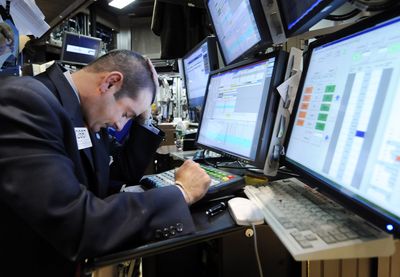Stocks plummet on recession fears
Dow plunges 514 points; S&P index lowest since 2003

NEW YORK – Wall Street tumbled again Wednesday as investors worried that the global economy is poised to weaken even as parts of the credit market slowly show signs of recovery. The major indexes fell more than 4 percent, including the Dow Jones industrial average, which finished off with a loss of 514 points.
The Standard & Poor’s 500 index was the worst performer among the major indexes with a 6.1 percent slide that left it at its lowest level since April 2003.
Corporate profit forecasts, a jump in the dollar and falling oil prices signaled investors are fearful that an economic slowdown will sweep the globe even if lending begins to approach more normal levels.
While reduced strains in global credit markets have eased some investors’ nervousness about the economy, market anxiety remains as hundreds of companies this week report third-quarter results and issue somewhat murky forecasts that are stirring unease about the economic bumps that may lay ahead.
Wachovia Corp., which is being bought by Wells Fargo & Co., reported that it swung to a huge loss in the third quarter while the drugmaker Merck & Co. said its quarterly profit fell 28 percent and that it would cut more than 10 percent of its work force.
John Thornton, co-portfolio manager at Stephens Investment Management Group LLC in Houston, said investors’ fear has shifted from the immediate concerns about tightness in credit and the resulting difficulty in borrowing to the broader economy as companies come out with their quarterly numbers.
“Even if it weren’t for the credit crisis we’d probably be looking toward a pretty tough recession anyway,” he said. “The third-quarter earnings are kind of uninspiring but third quarter hasn’t been the real concern of people. I think the concern is the depth and duration of the downturn and the effect it’s going to have on earnings.”
Meanwhile, credit markets showed improvement after virtually freezing up in the past month. Bank-to-bank lending rates fell sharply overnight, indicating that credit is becoming easier to obtain. The London Interbank Offered Rate, or Libor, on three-month loans in dollars fell to 3.54 percent from 3.83 percent, dropping for an eighth straight day.
Demand for Treasury bills, regarded as the safest assets around, grew slightly compared to the previous day as economic worries led investors to shun risky assets in favor of government bonds.
The three-month Treasury bill yielded 1.01 percent, down from 1.07 percent late Tuesday. The levels are a notable improvement from the 0.20 percent seen last Wednesday, when investors were willing to take the slimmest of returns in exchange for a safe place to keep their money.
The yield on the benchmark 10-year Treasury note, which moves opposite its price, fell to 3.60 percent from 3.74 percent late Tuesday. The dollar was sharply higher against other major currencies, while gold prices fell.
“We’re making slow progress and confidence is returning but we’re still not there yet,” said Christopher Cordaro, chief investment officer at RegentAtlantic Capital LLC in Chatham, N.J.
He said the latest batch of quarterly results, which cover results through Sept. 30, don’t reflect the full brunt of the credit freeze-up felt this month and the nervousness among some consumers following the stock market’s swoon.
While he expects corporate results will continue to worsen, he also said the markets remain “in panic mode” and investors are perhaps being overly dour in their assessment of how the economy will perform in the next few years.
“When you look at the fundamentals of equities around the world, stocks are selling for very cheap prices,” he said. “Behaviorally people project today’s current bad news much further out into the future than they should.”